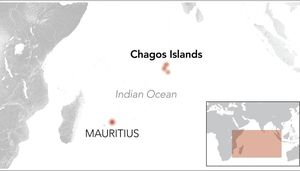Prime Minister Narendra Modi on February 4, 2025, surprised Lok Sabha MPs by recommending they read 'JFK's Forgotten Crisis' by Bruce Riedel, highlighting themes of historical foreign policy and challenging the legacy of former Prime Minister Jawaharlal Nehru. This suggestion emerged during discussions related to the government's handling of the India-China border situation, particularly following pointed critiques from Congress MP Rahul Gandhi and Samajwadi Party leader Akhilesh Yadav.
Modi’s recommendation rattled through the parliamentary halls, as the Prime Minister stated, "If someone is really interested in foreign policy... they should read JFK's Forgotten Crisis." He argued the book comprehensively exposes the “games” Nehru played concerning India’s foreign policy during turbulent periods, particularly during the 1962 Sino-Indian War.
Riedel's book delves deep not just on the Cold War dynamics but also intricately explores the tensions playing out during the early sixties, laying bare how Nehru's foreign policy ideals clashed with practical geopolitical realities. Modi presented the book as evidence of Nehru's shortcomings, prompting historical debates on Nehru’s vision versus the pragmatic threats posed by China. “When the country was facing many challenges, what game was going on in the name of foreign policy is being exposed through this book,” Modi compounded, alluding to Nehru’s diplomatic ties with then US President John F. Kennedy.
Interestingly, Modi's book reference was not just an academic suggestion but seemed to send ripples of political signaling, directly taking jabs at the Congress party's criticisms. Following Gandhi’s assertion of failures leading to Chinese incursions, Modi’s retort shaped the narrative to negate reflections on current governance by repositioning attention to past missteps by Nehru.
The historical backdrop is significant, as Riedel’s narrative reveals the erroneous assumptions Nehru had about his ability to navigate Indian diplomacy during the Kali Yuga of tensions with China. At the time, India was attempting to find its footing amid the Cold War’s polarized world order, leaning heavily on his vision for non-alignment.
Riedel’s book does not shy away from identifying the pivotal mistakes made during Nehru's administration. Modi reframed this narrative as part of his broader critique—questioning how Nehru's idealism perhaps left the nation ill-prepared for the subsequent military onslaught during the Sino-Indian War. Citing moments during the Kennedy era, the book encapsulates how diplomatic efforts were undoubtedly complicated by Nehru's personal tendencies, pointing to incidents where he was reportedly more engaged with Jacqueline Kennedy than with JFK himself. Social media users eagerly circulated these narratives, exclaiming how Nehru’s perceived distractions during key diplomatic engagements reflected dire inadequacies on the global stage.
“It was the worst state visit of his presidency,” Riedel captured Kennedy's own sentiments about Nehru's diplomacy during his time of state visit, reflecting the chaotic intricacies of their interactions against the backdrop of pressing national concerns. The passage showcasing Nehru's insistence for Mrs. Kennedy to stay within his residence rather than alternate accommodations also surfaced as telling—suggesting personal relationships often overshadowed bureaucratic formalities.
According to Riedel, Nehru’s increasing alignment on seeking military assistance from the United States during heightened tensions within India was yet another spotlighted evolution of his diplomatic approach. This shift illustrated how dire circumstances forced Nehru to adapt; even if it meant moving away from non-alignment toward seeking external support against common foes. Such historical reflections against the recent display of BJP’s governance prompted sharp discourse among contemporary observers.
Though Modi employed the book as both critique and counter-narrative, Congress leader Shashi Tharoor pushed back, expressing confusion over the connection Modi made about the book and the President's address. Tharoor articulated what many sought to understand: what relevance does this historical discourse possess within the current political fray?
Across political aisles, observers gauged how Modi's provocative references sparked needed dialogues surrounding leadership legacies and current foreign policy challenges. The discussion illustrated how historical narratives could arise anew amid contemporary criticisms, as Modi pushed for reevaluations of Nehru's role against current rhetorical frameworks.
PM Modi’s recommendation, juxtaposed against Congress's contemporary grievances, reflects the multifaceted nature of Indian political discourse today. Conversations surrounding Nehru's policy decisions evoke not only historical analysis but also provide layers to current geopolitical responsibilities. The underlying tension between past actions and present responses creates rich grounds for discussion—one especially pertinent as the nation continues to navigate its complex role on the world stage.



